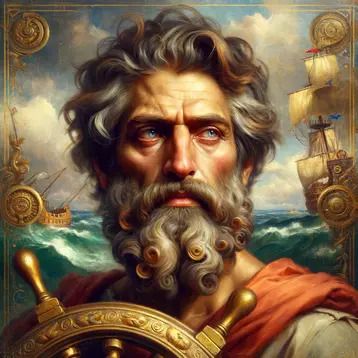
Charybdis
Charybdis :: The Whirlpool Monster
In the realm of Greek mythology, Charybdis was a notorious sea monster, embodying the perilous nature of the sea. Dwelling in the Strait of Messina, she became synonymous with maritime hazards and the fear of the unknown depths.
Charybdis' Homeland
Charybdis was said to reside under a rock on one side of the Strait of Messina, a narrow passage of water that presented a significant danger to ancient mariners. On the opposite side lay another fearsome creature, Scylla, dwelling within a rock. This proximity of two monsters made the strait a dreaded passage, as avoiding one monster meant coming perilously close to the other.
Charybdis' Role in Greek Mythology
Charybdis' most feared ability was to swallow vast quantities of water and then violently expel it, creating monstrous whirlpools. This terrifying phenomenon posed a grave threat to ships and sailors, capable of dragging them down to the ocean's depths. Her presence in the strait symbolized the unpredictable and often destructive power of the sea.
Charybdis' Family and Transformation
As a daughter of Poseidon and Gaea, Charybdis was initially a being who aided her father in his rivalry with Zeus. However, Zeus, enraged by her actions of flooding land with seawater, cursed Charybdis, transforming her into a monstrous entity condemned to swallow sea water perpetually, creating whirlpools as a result. This myth explains the natural phenomenon of whirlpools, attributing them to Charybdis' ceaseless hunger.
Charybdis in Greek Literature
Charybdis features prominently in two of the most famous Greek myths. In Homer's "Odyssey," Odysseus faces the difficult decision of navigating his ship close to either Scylla or Charybdis, a choice between two deadly fates. In the myth of "Jason and the Argonauts," the heroes also encounter the perils of Charybdis. These tales highlight the theme of navigating through life's challenges and the inevitability of facing dangers.
Legacy of Charybdis
The story of Charybdis transcends its mythological origins, becoming a metaphor for unavoidable danger and the choice between two evils, often referenced as "being between Scylla and Charybdis." Her legacy continues to influence literature, art, and language, symbolizing the unfathomable and treacherous aspects of nature and fate.
See Also: Scylla, Poseidon, Gaea, Zeus, Odysseus, Jason, Argonauts
Charybdis Q&A
Link/Cite Charybdis Page
Written by: The Editors of GreekMythology.com. GreekMythology.com editors write, review and revise subject areas in which they have extensive knowledge based on their working experience or advanced studies.
For MLA style citation use: GreekMythology.com, The Editors of Website. "Charybdis". GreekMythology.com Website, 30 Nov. 2023, https://www.greekmythology.com/Myths/Monsters/Charybdis/charybdis.html. Accessed 23 April 2024.






